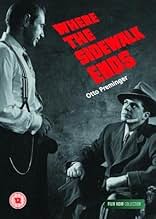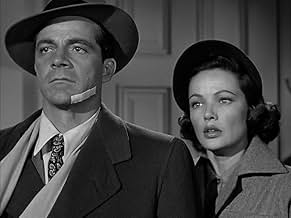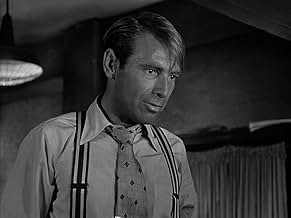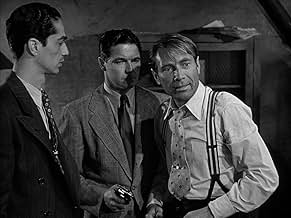AVALIAÇÃO DA IMDb
7,5/10
11 mil
SUA AVALIAÇÃO
O Detetive Mark Dixon quer ser algo que seu pai não era: um homem do lado certo da lei. Será que a natureza viciosa de Dixon levara o melhor sobre ele?O Detetive Mark Dixon quer ser algo que seu pai não era: um homem do lado certo da lei. Será que a natureza viciosa de Dixon levara o melhor sobre ele?O Detetive Mark Dixon quer ser algo que seu pai não era: um homem do lado certo da lei. Será que a natureza viciosa de Dixon levara o melhor sobre ele?
- Direção
- Roteiristas
- Artistas
- Prêmios
- 1 vitória no total
Fred Aldrich
- Detective at Staff Meeting
- (não creditado)
Don Appell
- Willie Bender
- (não creditado)
David Bauer
- Sid Kramer
- (não creditado)
Eddie Borden
- Pool Hall Patron
- (não creditado)
Neville Brand
- Steve
- (não creditado)
Barry Brooks
- Thug
- (não creditado)
Ralph Brooks
- Railroad Baggage Clerk
- (não creditado)
Oleg Cassini
- Oleg
- (não creditado)
John Close
- Hanson
- (não creditado)
Avaliações em destaque
At first glance, it would seem natural to compare Where the Sidewalk Ends with Laura. Both have noirish qualities, both were directed by Otto Preminger, and both star Dana Andrews and Gene Tierney. But that's where most of the comparisons end. Laura dealt with posh, sophisticated people with means who just happen to find themselves mixed-up in a murder. Where the Sidewalk Ends is set in a completely different strata. These are people with barely two nickels to rub together who are more accustomed to seeing the underbelly of society than going to fancy dress parties. Where the Sidewalk ends is a gritty film filled with desperate people who solve their problems with their fists or some other weapon. Small-time hoods are a dime-a-dozen and cops routinely beat confessions out of the crooks. Getting caught-up in a murder investigation seems as natural as breathing.
While I haven't seen his entire body of work, based on what I have seen, Dana Andrews gives one of his best performances as the beat-down cop, Det. Sgt. Mark Dixon. He's the kind of cop who is used to roughing up the local hoods if it gets him information or a confession. One night, he goes too far and accidentally kills a man. He does his best to cover it up. But things get complicated when he falls for the dead man's wife, Morgan Taylor (Tierney), whose father becomes suspect number one in the murder case. As Morgan's father means the world to her, Dixon's got to do what he can to clear the old man without implicating himself.
Technically, Where the Sidewalk Ends is outstanding. Besides the terrific performance from Andrews, the movie features the always delightful Tierney. She has a quality that can make even the bleakest of moments seem brighter. The rest of the cast is just as solid with Tom Tully as the wrongly accused father being a real standout. Beyond the acting, the direction, sets, lighting, and cinematography are all top-notch. Overall, it's an amazingly well made film.
If I have one complaint (and admittedly it's a very, very minor quibble) it's that Tierney is almost too perfect for the role and her surroundings. It's a little difficult to believe that a woman like that could find herself mixed-up with some of these unsavory characters. It's not really her fault, it's just the way Tierney comes across. She seems a little too beautiful, polished, and delicate for the part. But, her gentle, kind, trusting nature add a sense of needed realism to her portrayal.
While I haven't seen his entire body of work, based on what I have seen, Dana Andrews gives one of his best performances as the beat-down cop, Det. Sgt. Mark Dixon. He's the kind of cop who is used to roughing up the local hoods if it gets him information or a confession. One night, he goes too far and accidentally kills a man. He does his best to cover it up. But things get complicated when he falls for the dead man's wife, Morgan Taylor (Tierney), whose father becomes suspect number one in the murder case. As Morgan's father means the world to her, Dixon's got to do what he can to clear the old man without implicating himself.
Technically, Where the Sidewalk Ends is outstanding. Besides the terrific performance from Andrews, the movie features the always delightful Tierney. She has a quality that can make even the bleakest of moments seem brighter. The rest of the cast is just as solid with Tom Tully as the wrongly accused father being a real standout. Beyond the acting, the direction, sets, lighting, and cinematography are all top-notch. Overall, it's an amazingly well made film.
If I have one complaint (and admittedly it's a very, very minor quibble) it's that Tierney is almost too perfect for the role and her surroundings. It's a little difficult to believe that a woman like that could find herself mixed-up with some of these unsavory characters. It's not really her fault, it's just the way Tierney comes across. She seems a little too beautiful, polished, and delicate for the part. But, her gentle, kind, trusting nature add a sense of needed realism to her portrayal.
If all "film noirs" were this good, we would have a lot more of them. If someone were to ask me what is one I would tell them to go see this movie as a perfect example. This a 50 year old movie that doesn't feel old. In other words, nothing sounds corny and stupid as others of the time. Dana Andrews had a real hard edge on his shoulder much different than in The Best Years Of Our Lives. Without giving anything away, I recommend seeing this movie "cold" like I did and be thoroughly entertained.
Produced and directed by Otto Preminger, and starring Dana Andrews, the king of the B-movies, this is a terrific 20th-Century Fox film noir, all heavy woollen topcoats, stylish wide-brimmed hats and skewed camera angles. It's a film with a superb 'dark' look and a Ben Hecht script which delivers the authentic cadences of noirspeak.
Mark Dixon is a tough cop. His father was a small-time hood, and Dixon feels he has something to prove. He uses street methods, roughing-up bad guys and bullying stoolpigeons. He is not liked by his superiors, and has remained a detective sergeant, whereas his contemporary Lewis (Karl Malden) has played it by the book and has risen to the rank of lieutenant. Lewis is now Dixon's boss, and there is considerable tension between the two men.
Enter Ken Paine (Craig Stevens), a two-bit crook and bagman for Scalise (Guy Merrill). Tall, dark and handsome, and a much-decorated war hero, Paine is a drinker and a punk who lurks around cheap crap games. He is dating a dame by the name of Morgan Taylor (Gene Tierney), a looker with a whiff of glamour about her. Morgan is a fashion model in a Manhattan department store by day, and an 'escort' in Scalise's gambling club by night. Jiggs Taylor, her father (Tom Tulley), is a New York cabbie with a fondness for telling tall stories.
Dixon is on his last chance. The captain has made it clear - no more rough stuff. Then something dreadful happens, and Dixon panics and tries to cover it up. He sets in motion a train of events which he can't control, especially after he becomes emotionally involved with the beautiful Morgan. Dixon's tormented soul is the film's battleground, the instinct for self-preservation warring with a guilty conscience and a need to earn the girl's respect.
Though they do not spoil the movie, there are some things in the story which don't quite add up. A detective openly discusses a current investigation with a yellow cab driver, something which even the unorthodox Dixon would never do. Dishes are served to Dixon and Morgan in the restaurant, even though they didn't order anything specific. How is Morgan able to get to Paine's apartment in the couple of minutes which elapse after she hears the news? Why do the police interrogate Jiggs at the scene, in the presence of his daughter? Surely the detectives know better than to subject Jiggs to a confrontation ID without allowing him access to legal advice?
A 'noir' is nothing if not atmospheric, and this one is dripping with atmosphere. Brooklyn Bridge looms high over the mean streets, a skeletal silhouette which haunts the action like some urban angel of doom. New York City is the matrix in and through which these characters function, the context of their entire existence, and its presence is constantly felt. Whether by means of an el-train overhead, or a forest of skyscrapers swimming into focus through the locker-room window, the city surrounds and bears in upon these people, the malevolent nest through which they are obliged to scurry.
Dana Andrews is excellent as Dixon, the tough guy who retains our sympathy because he is capable of remorse. Watch out for Scalise's masseur, a very young Neville Brand.
It doesn't always help to be innocent, says Dixon, the hard man conscious of the harsh ways of the city, but the wretchedness of a guilty conscience is a terrible burden to bear. The camera conveys this beautifully, with a brooding Dixon large in the foreground as the investigation proceeds, and earlier, his horrified face twisted by a fish-eye lens as he realises the enormity of what he has done.
Verdict - A murky, grim film noir ... marvellous!
Mark Dixon is a tough cop. His father was a small-time hood, and Dixon feels he has something to prove. He uses street methods, roughing-up bad guys and bullying stoolpigeons. He is not liked by his superiors, and has remained a detective sergeant, whereas his contemporary Lewis (Karl Malden) has played it by the book and has risen to the rank of lieutenant. Lewis is now Dixon's boss, and there is considerable tension between the two men.
Enter Ken Paine (Craig Stevens), a two-bit crook and bagman for Scalise (Guy Merrill). Tall, dark and handsome, and a much-decorated war hero, Paine is a drinker and a punk who lurks around cheap crap games. He is dating a dame by the name of Morgan Taylor (Gene Tierney), a looker with a whiff of glamour about her. Morgan is a fashion model in a Manhattan department store by day, and an 'escort' in Scalise's gambling club by night. Jiggs Taylor, her father (Tom Tulley), is a New York cabbie with a fondness for telling tall stories.
Dixon is on his last chance. The captain has made it clear - no more rough stuff. Then something dreadful happens, and Dixon panics and tries to cover it up. He sets in motion a train of events which he can't control, especially after he becomes emotionally involved with the beautiful Morgan. Dixon's tormented soul is the film's battleground, the instinct for self-preservation warring with a guilty conscience and a need to earn the girl's respect.
Though they do not spoil the movie, there are some things in the story which don't quite add up. A detective openly discusses a current investigation with a yellow cab driver, something which even the unorthodox Dixon would never do. Dishes are served to Dixon and Morgan in the restaurant, even though they didn't order anything specific. How is Morgan able to get to Paine's apartment in the couple of minutes which elapse after she hears the news? Why do the police interrogate Jiggs at the scene, in the presence of his daughter? Surely the detectives know better than to subject Jiggs to a confrontation ID without allowing him access to legal advice?
A 'noir' is nothing if not atmospheric, and this one is dripping with atmosphere. Brooklyn Bridge looms high over the mean streets, a skeletal silhouette which haunts the action like some urban angel of doom. New York City is the matrix in and through which these characters function, the context of their entire existence, and its presence is constantly felt. Whether by means of an el-train overhead, or a forest of skyscrapers swimming into focus through the locker-room window, the city surrounds and bears in upon these people, the malevolent nest through which they are obliged to scurry.
Dana Andrews is excellent as Dixon, the tough guy who retains our sympathy because he is capable of remorse. Watch out for Scalise's masseur, a very young Neville Brand.
It doesn't always help to be innocent, says Dixon, the hard man conscious of the harsh ways of the city, but the wretchedness of a guilty conscience is a terrible burden to bear. The camera conveys this beautifully, with a brooding Dixon large in the foreground as the investigation proceeds, and earlier, his horrified face twisted by a fish-eye lens as he realises the enormity of what he has done.
Verdict - A murky, grim film noir ... marvellous!
An excellent opening title sequence starts this gritty Noir off in perfect step with what will follow. The son of a thief who was killed while attempting to shoot himself out of jail, Mark Dixon became a cop in an attempt to atone for the sins of the father, but cannot quite escape the fathers blood surging through his veins every time he strikes out at a hood, and it's his excessive use of force that gets him demoted with the threat of losing his job as detective, the only thing he ever wanted out of life. When he accidentally kills a witness to a murder, panic takes hold of him and he proceeds to cover up the evidence, but fate has a way of meting out cruel justice. Mark will fall in love for his victim's ex, and then her innocent uncle through another freak accident ends up taking the rap for the murder when the body turns up. And now the real moment of truth - atone for his own sins and free an innocent man, but probably lose the girl, or say nothing, keep the girl, but end up being just like his father? A brilliantly executed noir by Preminger and Dana Andrews nails one of the best performances of his career as the tormented detective.
I'm a big fan of fan of film noir, and this film by Otto Preminger easily stands as one of the best that I've seen! Preminger has reunited two of his stars from the hit 'Laura' - Gene Tierney and Dana Andrews, for an entirely different sort of crime film. Laura was based around love, and this film is based around hate; as we watch police detective Mark Dixon, a copper already suffering scrutiny from his superiors for his heavy handed tactics, accidentally kill a suspect and try to pin the murder on a known criminal; a man by the name of Tommy Scalisi. The plot is brilliantly worked, and Preminger excellently balances several plot points; but it all comes back down to the main moral implication surrounding our main character. The fact that the film is set in the criminal underground means that the plot is given an excellent base to work from, and director Otto Preminger expertly captures the sleazier side of life by showing the main characters gambling, beating one another (and their women), shooting and more - and this also helps to offset the film from the earlier 'Laura', which was very much set in upper class society.
The role of Mark Dixon gives Dana Andrews one of the most interesting parts of his career. Here, we have a character that is difficult to like as he's so cold - but the fact that we can understand his motives ensures that he's easy to sympathise with, and that allows the audience the ability to plug into his plight. The character development is well timed, and as we've follows this character and his motivations throughout the film; everything makes sense by the end. His co-star is the beautiful Gene Tierney, who isn't given as much to do in this film as she was in Laura; a film that made Tierney its linchpin. She does well with what she's got, however, and the lead duo's chemistry is excellent and Tierney helps to complete every scene she's in. I can't say that this is a better film than the earlier Laura; that's a hard act to follow, but this film certainly fits into the film noir formula better than Preminger's earlier film. The film also makes a good comparison piece for Laura; as just about everything in this film is opposite to the 1944 movie, yet it's all strangely familiar. Highly recommended to all!
The role of Mark Dixon gives Dana Andrews one of the most interesting parts of his career. Here, we have a character that is difficult to like as he's so cold - but the fact that we can understand his motives ensures that he's easy to sympathise with, and that allows the audience the ability to plug into his plight. The character development is well timed, and as we've follows this character and his motivations throughout the film; everything makes sense by the end. His co-star is the beautiful Gene Tierney, who isn't given as much to do in this film as she was in Laura; a film that made Tierney its linchpin. She does well with what she's got, however, and the lead duo's chemistry is excellent and Tierney helps to complete every scene she's in. I can't say that this is a better film than the earlier Laura; that's a hard act to follow, but this film certainly fits into the film noir formula better than Preminger's earlier film. The film also makes a good comparison piece for Laura; as just about everything in this film is opposite to the 1944 movie, yet it's all strangely familiar. Highly recommended to all!
Você sabia?
- CuriosidadesThis is the last in a series of films that Otto Preminger made as a director-for-hire for Twentieth Century Fox in the 1940s. The series includes Laura (1944), which also stars Gene Tierney and Dana Andrews, Anjo ou Demônio? (1945) and A Ladra (1950).
- Erros de gravaçãoWhen Dixon is staging the murder scene after Ken Paine' death, he is gloveless. A few seconds later he has gloves on both hands.
- Citações
[to Detective Dixon]
Insp. Nicholas Foley: Your job is to detect criminals, not to punish them.
- Cenas durante ou pós-créditosThe opening credits start as chalk writing on a sidewalk with someone walking over them and whistling.
- ConexõesFeatured in Gene Tierney: Final Curtain for a Noir Icon (2008)
Principais escolhas
Faça login para avaliar e ver a lista de recomendações personalizadas
- How long is Where the Sidewalk Ends?Fornecido pela Alexa
Detalhes
- Data de lançamento
- País de origem
- Idioma
- Também conhecido como
- Al borde del peligro
- Locações de filme
- 58 Pike Street, Manhattan, Nova Iorque, Nova Iorque, EUA(Ken Paine's apartment - between Madison and Monroe Streets - since demolished. Note Manhattan Bridge in the background)
- Empresa de produção
- Consulte mais créditos da empresa na IMDbPro
Bilheteria
- Orçamento
- US$ 1.475.000 (estimativa)
- Tempo de duração1 hora 35 minutos
- Cor
- Proporção
- 1.37 : 1
Contribua para esta página
Sugerir uma alteração ou adicionar conteúdo ausente

Principal brecha
By what name was Passos na Noite (1950) officially released in India in English?
Responda

































